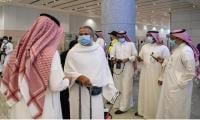ISLAMABAD: As the Islamabad High Court (IHC) resumes hearing of the deposed Prime Minister Muhammad Nawaz Sharif’s appeal against his conviction in the London apartments’ reference after a long adjournment on September 18, a number of key developments that took place over the past 10 weeks attracted public attention and fueled controversies.
Abandoning its “fast track” policy to get an early favourable judgment leading to the ex-premier’s release from prison, his legal team led by Khawaja Haris sought in late June postponement of proceedings on the appeal until the end of summer vacations in mid-September.
The former prime minister was convicted by the accountability court on Dec 24, 2018 and since then he has been in jail except for six weeks when he was granted temporary bail for his medical treatment.
The first major episode that occurred on July 6 after the adjournment of the instant appeal was the public release by Pakistan Muslim League-Nawaz (PML-N) Vice President Maryam of the audio-video recording of accountability court judge Arshad Malik, who had convicted Nawaz Sharif in one reference and acquitted him in the other. Four days later, she released two more clips of the video which showed Judge Malik's "official car with a green number plate" coming to escort the main character of the saga, PML-N activist Nasir Butt, who then followed the car to the judge's residence.
This video, shot by a person riding a motorcycle, appeared to show a white Sedan with a green number plate approaching a Land Cruiser before both vehicles drove away. Maryam claimed that the video belies all claims of Judge Malik that he mentioned in his press statement.
The second video showed Nasir Butt entering the residence of the judge, who “comes in, greets Nasir Butt and switches the lights on.” In his press statement of July 7 and affidavit of July 11, Arshad Malik denied Maryam’s claims but made a lot of confessions and admissions that created problems for him subsequently in the Supreme Court. They have also led to the initiation of the disciplinary proceedings against him by the Lahore High Court (LHC).
The second important development took place on Aug 10 when Maryam was arrested by the National Accountability Bureau (NAB) when she was meeting Nawaz Sharif in Kot Lakhpat Jail Lahore along with her cousin, Yousuf Abbas, in the Chaudhry Sugar Mills investigations. Before that the NAB filed an application against Maryam in accountability judge Muhammad Bashir’s court seeking action against her for allegedly submitting a bogus trust deed regarding the London apartments to the Panama Joint Investigation Team (JIT) formed by the Supreme Court. The anti-graft agency had done so one year after the accountability court’s judgment in this case. On July 20, the judge quashed the NAB plea.
In 2017, the JIT report concluded that the trust deed it received from Maryam was forged, as it used Calibri font when it was not even available for public use. The apex court too ruled that the persons concerned should be proceeded against if any document was found to be forged.
The third episode took place three days ago when the Federal Investigation Agency cleared three arrested accused, Nasir Janjua Mahar Jilani and Khurram Yousuf, who figured in Judge Arshad Malik’s affidavit filed in the IHC, which has been made part of Nawaz Sharif’s undecided appeal. On the basis of the FIA findings, a Islamabad judge acquitted the three of all the charges, leveled by Arshad Malik in his sworn statement.
Prior to this in August, the apex court heard and decided a slew of petitions, filed by those unconnected with the video scandal, and a three-member bench led by Chief Justice Asif Saeed Khosa held that Arshad Malik’s admitted conduct was shocking, abhorrent and offensive to the image of a judge in the society. His press release and the affidavit are themselves damning indictments against him, he ruled. “His admitted conduct emerging from that press release and the affidavit stinks and the stench of such stinking conduct has the tendency to bring a bad name to the entire judiciary as an institution. He had unabashedly admitted in the press release and the affidavit that he had a shady past and had skeletons in his cupboard for which he was vulnerable to blackmail, during the trial being conducted by him he had been holding private meetings with sympathizers of the accused person being tried by him, he was threatened and inducements were offered to him during the trial but he had not reported the same to any superior authority and had never considered recusing from the trial, after convicting the accused person in the trial he had met the convict at his residence in a different city, he had even met a son of the convict in a different country, and finally, he had tried to help the convict in his appeal filed against his own judgment by dictating some grounds of appeal and pointing out some stated weaknesses in the case against the convict convicted by him,” the judgment said.
It cited a number of case laws in which an audio or video was either discussed or admitted as evidence subject to fulfillment of certain conditions. Justice Khosa, who authored the decision, referred to at least 17 decided and reported cases in this connection. There were five judgments in which the admissibility of an audio tape or video in evidence before a court and the mode and manner of proving the same has been discussed in Pakistan and abroad. Some 12 cases were quoted in which a video recording or footage was held to be admissible in evidence upon fulfillment of some conditions. The precedent cases showed that for proving an audio tape or video before a court of law, some 21 requirements are mandatory.
Before that, the IHC rejected a petition seeking suspension of Nawaz Sharif’s sentence on medical grounds. It was decided by Justice Amir Farooq and Justice Mohsin Akhtar Kayani, who will resume hearing on his appeal on September 18.
Simultaneously, the panel will hold proceedings on the NAB appeal against the former prime minister’s acquittal in the other reference by Arshad Malik. It is anybody’s guess how far these principal developments will impact the outcome of these appeals against the judgments of the same accountability judge.
Kasuri urged authorities of Pakistan and China to pull their resources to defeat forces seeking to disrupt the...
IHC said that several people had not returned the cipher copies they had, and asked if it meant it was right for the...
Gilani gave floor to Leader of Opposition Syed Shibli Faraz, who insisted that with unity they could take country...
Match witnessed intense action and dramatic twists, keeping fans on the edge of their seats until the final ball
Apex court bench was reconstituted after Justice Yahya Afridi recused himself from hearing the case earlier this month
ECP issued a notification in this connection pursuant to orders passed by LHC







